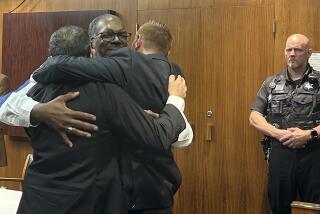Ruling revives Blackwater shooting case
- Share via
A federal appeals court has revived the manslaughter prosecution of four Blackwater security guards who were charged after a 2007 bloodbath that left more than a dozen Iraqi civilians dead.
That horrific act of violence occurred in Baghdad on Sept. 16, 2007. When a car bomb exploded near a meeting between Iraqi officials and a U.S. diplomat, a team from the security contractor blocked traffic at a crowded city square in order to get the diplomat to safety. Suddenly, shots were fired. According to prosecutors, the guards killed 14 and wounded 20 more in an unprovoked hail of gunfire; attorneys for the guards say they acted in self-defense.
Within hours of the incident, the guards were questioned by the State Department’s Diplomatic Security Service. Two days later, they turned in sworn written statements to the State Department, using a form guaranteeing that the statement and any evidence it generated would not be used in a criminal proceeding.
Yet news accounts of their statements were widely disseminated and were read by some prosecution witnesses. Concluding that much of the potential evidence against the guards was tainted, a federal district judge dismissed the indictments of the defendants in late 2009.
In reinstating the prosecution, the U.S. Court of Appeals for the District of Columbia Circuit reproved the trial judge for an “erroneous view of the law.” But the ruling wasn’t a complete victory for the government. In returning the case to the district court, the appeals court ordered it to be more selective in deciding whether evidence was tainted. That means that some or all of the defendants could still be confronted with incriminating evidence if it was obtained from sources other than their submissions to State Department investigators. But it’s also possible that the trial judge will find that important evidence has been tainted by contact with the defendants’ immunized statements.
Justice for the victims is extremely important. But regardless of what happens next, the legal process will have shown Iraqis how much this country values constitutional rights, including the right against self-incrimination. The other lesson Iraqis may learn from this case is that rights come at a cost.
More to Read
A cure for the common opinion
Get thought-provoking perspectives with our weekly newsletter.
You may occasionally receive promotional content from the Los Angeles Times.








